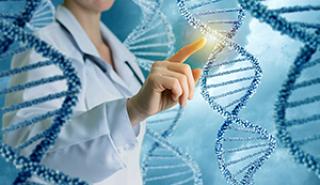
Three research groups at University of Utah Health are collaborating with Janssen Research & Development, LLC (“Janssen”) to advance the study of colorectal cancer, diabetic kidney disease, and juvenile idiopathic arthritis respectively.
“The University of Utah is uniquely positioned to find the genes that may be responsible for disease,” said Willard Dere, MD, Executive Director of the Program in Personalized Health and Co-Director of the Utah Center for Clinical and Translational Science. “Janssen has resources to translate these discoveries into new therapies that could advance clinical care.”
In these collaborations, Janssen will provide genome sequencing for each study to advance the identification of genetic culprits of disease with the aim of developing new therapeutic approaches to help patients live long and fulfilling lives.
Colorectal Cancer
Deborah Neklason, PhD, research associate professor in Internal Medicine at U of U Health, has focused her career on finding the genetic underpinning of colon cancer. In an extreme form, Lynch syndrome is a collection of hereditary gastrointestinal cancers that result from the mutation in genes responsible for DNA repair.
Unexpectedly, some people with this genetic mutation get cancer while others do not. Even stranger, some families experience anticipation, a phenomenon where members of each successive generation develop cancer at younger and younger ages.
During the next three years, Neklason will collaborate with Janssen scientists to analyze the genomic sequences from families that experience anticipation and those that do not to see if they can pinpoint the genetic reason for why this happens. She will leverage analytical tools developed by Aaron Quinlan, PhD, associate professor in Human Genetics and an associate director of the USTAR Center for Genetic Diversity, to mine the newly sequenced genomes.
“As a trained geneticist, I am excited to understand anticipation in the genome,” Neklason said. “This is meaningful because we are hoping that this information will help us to treat people, improve, and save lives.”
Diabetic Kidney Disease
Diabetes slowly prevents the kidneys from effectively filtering the blood, damaging the organ and leading to additional health problems. Diabetic kidney disease affects 40 percent of patients with type 1 and type 2 diabetes. While not all patients develop this condition, previous work shows that it appears to cluster in families, suggesting a genetic component.
“We are improving on previous work using the unique resources available in Utah,” said Marcus Pezzolesi, PhD, MPH, assistant professor in Internal Medicine at U of U Health. “I am excited that we might identify candidate genes that could be targeted therapeutically.”
Pezzolesi plans to search the Utah Population Database, which contains an extensive set of family histories linked to demographic and medical information, and the University of Utah Enterprise Data Warehouse, which contains medical records from millions of patients, for the past two decades to retrospectively identify patients that have experienced a rapid decline in kidney function.
“A study like this takes a number of resources to make it work,” Pezzolesi said. “We are excited by this collaboration, because we will have more heads trying to tackle this complex problem.”
Juvenile Idiopathic Arthritis
Childhood-Onset Rheumatoid Arthritis, also called Rheumatoid Factor Positive Juvenile Idiopathic Arthritis, affects nearly one in every 10,000 children born in the United States. In Utah, it affects five children born in the state every year. John Bohnsack, MD, professor of pediatrics at U of U Health, wants to identify potential genetic offenders.
“Rheumatoid Arthritis typically starts in middle age, but we have identified a cohort of very young children with this disorder,” Bohnsack said. “It makes you wonder if there are rare gene variants in these patients that tip the immune system to set this disease in motion.”
In this study, Bohnsack will search for rare gene variants in a population of patients and family members identified in earlier studies.
“Scientists and clinicians at Janssen and at the University of Utah have been in the forefront of utilizing knowledge of human genetics to develop a deeper understanding of the causes of disease,” said Guna Rajagopal, Global Head of Computational Sciences at Janssen. “We are confident that the unique resources and expertise at U of U Health, combined with Janssen expertise in drug discovery form a powerful partnership that will facilitate the translation of the insights gained from our collaboration into safe and effective medicines. This will ultimately lead to better outcomes for patients.”
Janssen will provide the capabilities to rapidly sequence the samples collected by U of U Health researchers and collaborate with the researchers to pinpoint genetic markers that could advance the study of each disorder.
